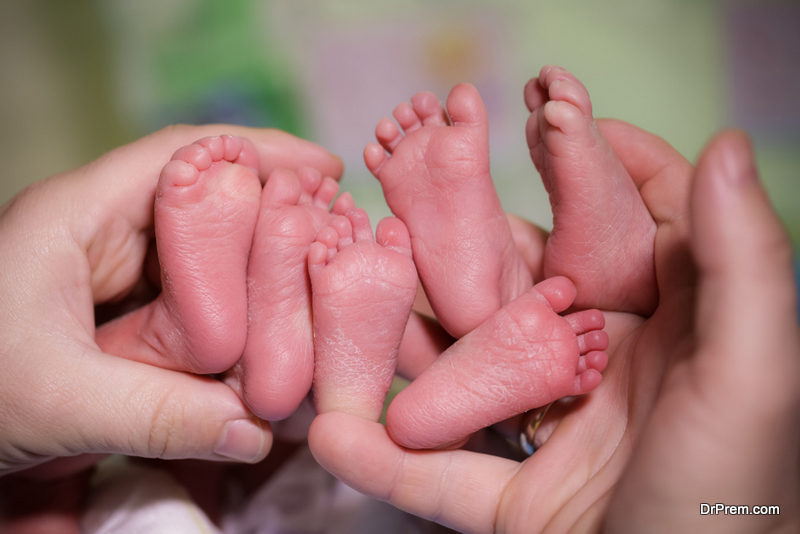Jaxson, Nutella, Cyanide, and Taula Does the Hula from Hawaii – these are not the names of brands (except Nutella). They are baby names, which the millennials have given to their offspring. These names aren’t even in top 10 on the list of the most weird baby names. In a bid to sound unique, cool, and hippie in a generation which ruled by the number of likes on the social media platforms, these millennial parents are looking up for unique baby names. But are these names really creative, different and special? Probably not.
Studies reveal why parents go for unique baby names
 Jean Twenge, a professor of psychology from the San Diego State University, conducted a study in 2010. The study looked at the names of more than 300 million American infants born between 1880 -2007. In the study, Twenge found out that since the 1950s, common baby names have become less popular. In 1950, more than 30 percent of baby boys were given a name from the top-10 common names by the parents. By the time it was 2007, the number reduced to just under 10 percent.
Jean Twenge, a professor of psychology from the San Diego State University, conducted a study in 2010. The study looked at the names of more than 300 million American infants born between 1880 -2007. In the study, Twenge found out that since the 1950s, common baby names have become less popular. In 1950, more than 30 percent of baby boys were given a name from the top-10 common names by the parents. By the time it was 2007, the number reduced to just under 10 percent.
According to Twenge, parents are choosing unique baby names for their offspring. If they cannot find anything unique, they settle with altered versions of common names. So, Jackson becomes Jaxon. Other parents go for double-barreled names for their babies. So, Marie –Rose or Scott –Joy becomes great choices. Japanese parents have also started combining traditional Japanese characters with unusual pronunciations.
In a German town, some researchers conducted another small study. They analyzed baby names, starting from the year 1894. They found that in 1894, a mere 32% babies had unique names. But by the time the timeline reaches 1994, the statistics have increased to 77%.
The question is – what is the reason behind millennial parents choosing unique baby names?
The psychology behind weird and unique baby names
 Developed countries such as the USA, Japan, and Germany have entered the age of individualization. As more and more digital space begins to consume us, we begin to realize that there is a lot that binds the world together. Millennials resent that. They don’t want to be like everyone else. They want to stand out. And why not? After all, this is what the major institutions around the world teaching them – to be unique.
Developed countries such as the USA, Japan, and Germany have entered the age of individualization. As more and more digital space begins to consume us, we begin to realize that there is a lot that binds the world together. Millennials resent that. They don’t want to be like everyone else. They want to stand out. And why not? After all, this is what the major institutions around the world teaching them – to be unique.
So, it doesn’t come as a surprise that the millennials want not only their own selves, but also their babies to be unique and different. The first step to do this is to give their offspring unique or weird names. After all, there should be no one like their child. Or else, how will create its own identity in this dog-eats-dog world?
Wealth makes people stick to the uniqueness
 Michael Varnum, Arizona State University’s assistant psychology professor conducted a study, where he noticed that people in the more developed, stable, and ever-progressing sections of the society tend to go with unique baby names. These developed parts of any particular society are big on expressing individuality – and hence, the unique names. But, what is the connection between wealth, individuality and uniqueness?
Michael Varnum, Arizona State University’s assistant psychology professor conducted a study, where he noticed that people in the more developed, stable, and ever-progressing sections of the society tend to go with unique baby names. These developed parts of any particular society are big on expressing individuality – and hence, the unique names. But, what is the connection between wealth, individuality and uniqueness?
According to Professor Varnum, wealthy people are financially and socially secure. Hence, they can afford to break ties with conformity and adhere to the individual expression of uniqueness. Moreover, Professor Varmun states that wealthy people are better off when they are away from the crowds, since it presents various opportunities for innovation.
However, Varnum also noted that people in the less economically developed parts of the world choose to stick to common baby names, in a bid to play it safe. People who lack enough financial or social resources to move ahead in life stick to conformity – and this reflects in their choice of baby names as well.
Your name can affect your social life
 Various studies suggest that people with easy-to-pronounce names are perceived positively by the world around them. Not only that, these people (because of names that stand out) are often placed at higher positions in their professional lives.
Various studies suggest that people with easy-to-pronounce names are perceived positively by the world around them. Not only that, these people (because of names that stand out) are often placed at higher positions in their professional lives.
Also, people with unique names have a more successful romantic life. They get more swipes on online dating applications, and people prefer to hang around them more often.
Unique baby names blur gender boundaries
 David Figlio, Institute for Policy Research’s director at Northwestern University conducted a study earlier, which revealed that the more androgynous a baby girl’s name is, the better the chances of her pursuing mathematics or scientific research in the future. The study also traced a pattern where it is more likely for a girl to enter masculine fields of study if she is given a androgynous or masculine name.
David Figlio, Institute for Policy Research’s director at Northwestern University conducted a study earlier, which revealed that the more androgynous a baby girl’s name is, the better the chances of her pursuing mathematics or scientific research in the future. The study also traced a pattern where it is more likely for a girl to enter masculine fields of study if she is given a androgynous or masculine name.
However, a study done by Figlio on baby boys’ names showed varied and different results. Figlio’s study on boy names show that the more feminine a boy’s name, the more disruption in his life. This might be because in most countries around the world – masculine is a treasure trait. If boys are given feminine names, at the very core at their being, this masculinity begins to fade. These boys start feeling more emasculated, and hence, they might struggle to come to grips with their identity.
Thus, it makes sense to have unique baby names that blurs the distinction between feminine and masculine names – so that these social, educational or professional biases can be limited largely.
Is it crucial to come up with unique baby names?
 Unique baby names seem like a good place to start with if parents are trying to create an individualistic existence for their infant. But, it is highly crucial to understand that uniqueness is not always legible. Unique names can only benefit the child to some extent in the future. But beyond surface level, one must rely on hard work, skill, and determination to stand out and succeed in life. In a bid to shun conformity, or to establish a presence, or to stay away from commonality – one can turn to choosing unique names. But, just like everything else in this world, one should notice the thin line and try not to cross it.
Unique baby names seem like a good place to start with if parents are trying to create an individualistic existence for their infant. But, it is highly crucial to understand that uniqueness is not always legible. Unique names can only benefit the child to some extent in the future. But beyond surface level, one must rely on hard work, skill, and determination to stand out and succeed in life. In a bid to shun conformity, or to establish a presence, or to stay away from commonality – one can turn to choosing unique names. But, just like everything else in this world, one should notice the thin line and try not to cross it.




